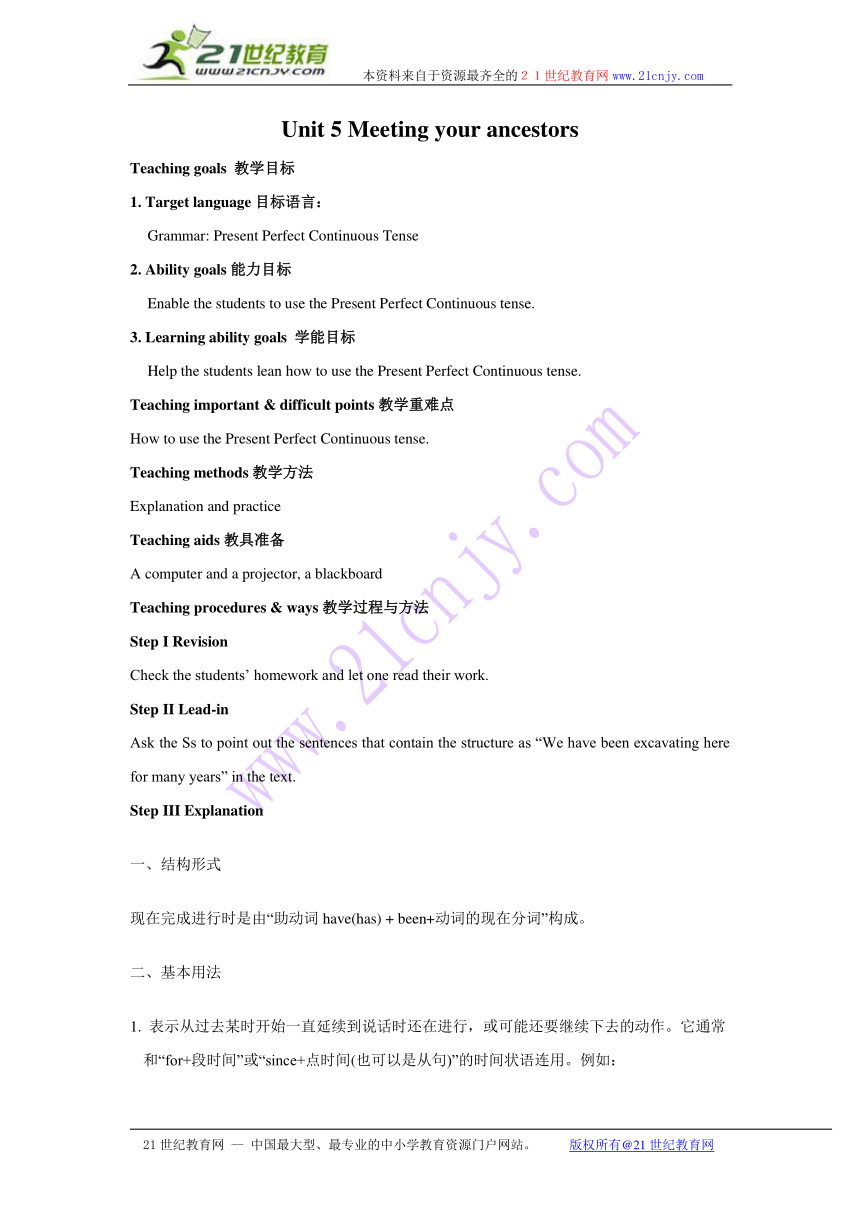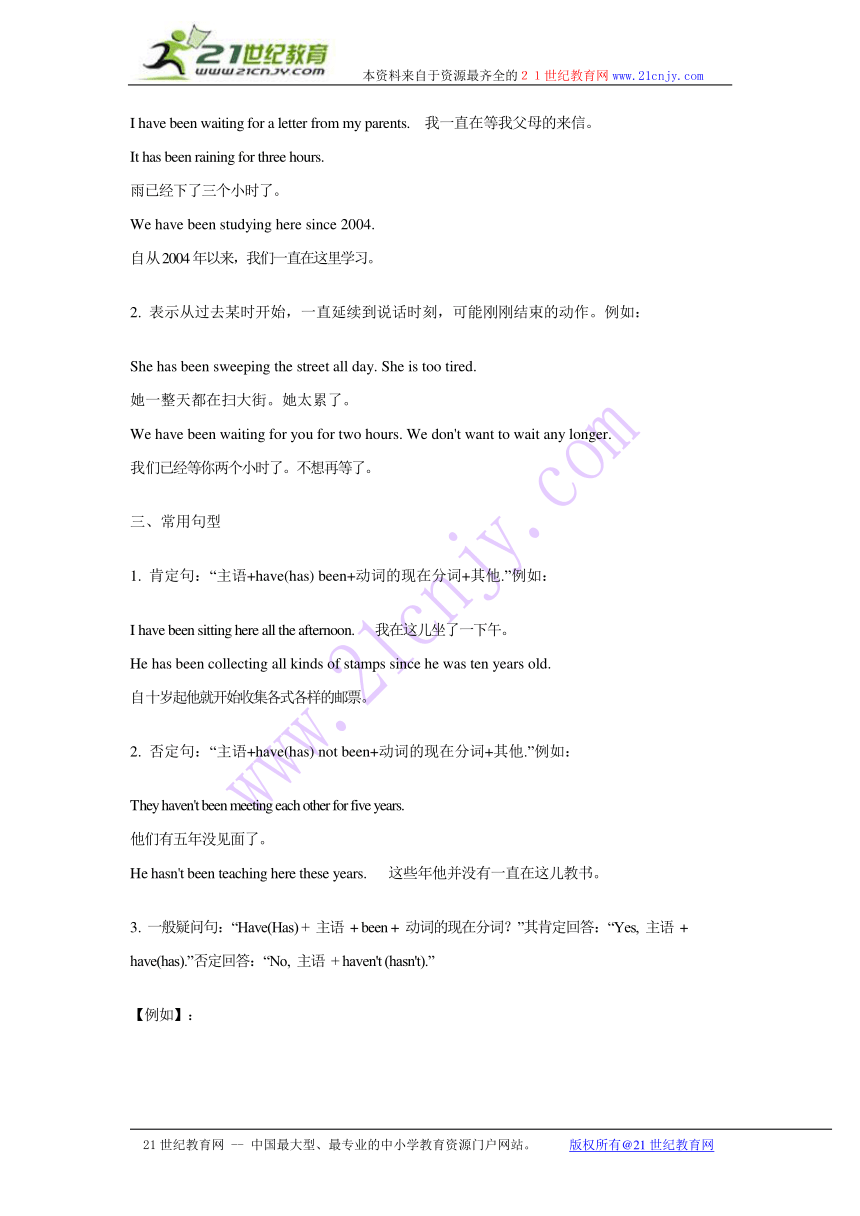Unit 5 Meeting your ancestors 教案-grammar(新人教版选修8)
文档属性
| 名称 | Unit 5 Meeting your ancestors 教案-grammar(新人教版选修8) |

|
|
| 格式 | rar | ||
| 文件大小 | 13.6KB | ||
| 资源类型 | 教案 | ||
| 版本资源 | 人教版(新课程标准) | ||
| 科目 | 英语 | ||
| 更新时间 | 2009-07-16 06:54:00 | ||
图片预览


文档简介
本资料来自于资源最齐全的21世纪教育网www.21cnjy.com
Unit 5 Meeting your ancestors
Teaching goals 教学目标
1. Target language目标语言:
Grammar: Present Perfect Continuous Tense
2. Ability goals能力目标
Enable the students to use the Present Perfect Continuous tense.
3. Learning ability goals 学能目标
Help the students lean how to use the Present Perfect Continuous tense.
Teaching important & difficult points教学重难点
How to use the Present Perfect Continuous tense.
Teaching methods教学方法
Explanation and practice
Teaching aids教具准备
A computer and a projector, a blackboard
Teaching procedures & ways教学过程与方法
Step I Revision
Check the students’ homework and let one read their work.
Step II Lead-in
Ask the Ss to point out the sentences that contain the structure as “We have been excavating here for many years” in the text.
Step III Explanation
一、结构形式
现在完成进行时是由“助动词have(has) + been+动词的现在分词”构成。
二、基本用法
1. 表示从过去某时开始一直延续到说话时还在进行,或可能还要继续下去的动作。它通常和“for+段时间”或“since+点时间(也可以是从句)”的时间状语连用。例如:
I have been waiting for a letter from my parents. 我一直在等我父母的来信。
It has been raining for three hours.
雨已经下了三个小时了。
We have been studying here since 2004.
自从2004年以来,我们一直在这里学习。
2. 表示从过去某时开始,一直延续到说话时刻,可能刚刚结束的动作。例如:
She has been sweeping the street all day. She is too tired.
她一整天都在扫大街。她太累了。
We have been waiting for you for two hours. We don't want to wait any longer.
我们已经等你两个小时了。不想再等了。
三、常用句型
1. 肯定句:“主语+have(has) been+动词的现在分词+其他.”例如:
I have been sitting here all the afternoon. 我在这儿坐了一下午。
He has been collecting all kinds of stamps since he was ten years old.
自十岁起他就开始收集各式各样的邮票。
2. 否定句:“主语+have(has) not been+动词的现在分词+其他.”例如:
They haven't been meeting each other for five years.
他们有五年没见面了。
He hasn't been teaching here these years. 这些年他并没有一直在这儿教书。
3. 一般疑问句:“Have(Has) + 主语 + been + 动词的现在分词?”其肯定回答:“Yes, 主语 + have(has).”否定回答:“No, 主语 + haven't (hasn't).”
【例如】:
— Have you been studying for the English test today
你今天一直在准备英语测试吗?
— Yes, I have. / No, I haven't.
是的。 / 不,我没有。
— Has Daniel been skating for two years 丹尼尔滑冰已经有两年了吗?
— Yes, he has. / No, he hasn't.
是的。/ 不,他没有。
4. 特殊疑问句:“ 特殊疑问词 + 一般疑问句?”
【例如】:
What book have you been reading recently 最近你在看什么书?
How has your uncle been getting on with his work
你叔叔的工作进展得怎么样?
四、注意事项
有些不能用现在进行时的动词,如be, have, like, love, know, see, hear等,同样也不能用现在完成进行时,而应用现在完成时。例如:
The poor woman has been ill for a long time. 那可怜的妇人已经病了好久了。
Have you seen her parents these days 这些天你看见她的父母了吗?
时态对比
1. 现在完成进行时与现在进行时比较:
现在完成进行时强调某一动作从过去一直延续到现在;而现在进行时只指目前正在发生的动作。试比较:
Susan has been reading that storybook since last night.
从昨晚开始苏珊就一直在看那本故事书。
Susan is reading a storybook now.
苏珊正在看一本故事书。
2. 现在完成进行时和现在完成时比较:
⑴有些动词(如:work, study, live, teach等)用现在完成进行时与现在完成时表达的意思差不多。试比较:
The teacher has been teaching at this school for ten years.
十年来,那位老师一直在这所学校教书。
The teacher has taught at this school for ten years.
那位老师在这所学校已经教了十年书了。
⑵英语中的多数动词在这两种时态中表示不同的含义。现在完成时如果不带表示一段时间的状语,就只能表示动作的完成,而现在完成进行时则表示动作的延续。试比较:
They have built a new lab.
他们建造了一幢新的实验室。(表示动作的完成)
They have been building a new lab (these years).
他们(这几年)一直在建造一幢新的实验室。(无论用时间状语还是不用时间状语,都表示动作的延续)
Step IV Practice (Using Structures in Workbook)
Step V Homework
Ask the students finish Exercise in Word Study Part.
21世纪教育网 -- 中国最大型、最专业的中小学教育资源门户网站。 版权所有@21世纪教育网
Unit 5 Meeting your ancestors
Teaching goals 教学目标
1. Target language目标语言:
Grammar: Present Perfect Continuous Tense
2. Ability goals能力目标
Enable the students to use the Present Perfect Continuous tense.
3. Learning ability goals 学能目标
Help the students lean how to use the Present Perfect Continuous tense.
Teaching important & difficult points教学重难点
How to use the Present Perfect Continuous tense.
Teaching methods教学方法
Explanation and practice
Teaching aids教具准备
A computer and a projector, a blackboard
Teaching procedures & ways教学过程与方法
Step I Revision
Check the students’ homework and let one read their work.
Step II Lead-in
Ask the Ss to point out the sentences that contain the structure as “We have been excavating here for many years” in the text.
Step III Explanation
一、结构形式
现在完成进行时是由“助动词have(has) + been+动词的现在分词”构成。
二、基本用法
1. 表示从过去某时开始一直延续到说话时还在进行,或可能还要继续下去的动作。它通常和“for+段时间”或“since+点时间(也可以是从句)”的时间状语连用。例如:
I have been waiting for a letter from my parents. 我一直在等我父母的来信。
It has been raining for three hours.
雨已经下了三个小时了。
We have been studying here since 2004.
自从2004年以来,我们一直在这里学习。
2. 表示从过去某时开始,一直延续到说话时刻,可能刚刚结束的动作。例如:
She has been sweeping the street all day. She is too tired.
她一整天都在扫大街。她太累了。
We have been waiting for you for two hours. We don't want to wait any longer.
我们已经等你两个小时了。不想再等了。
三、常用句型
1. 肯定句:“主语+have(has) been+动词的现在分词+其他.”例如:
I have been sitting here all the afternoon. 我在这儿坐了一下午。
He has been collecting all kinds of stamps since he was ten years old.
自十岁起他就开始收集各式各样的邮票。
2. 否定句:“主语+have(has) not been+动词的现在分词+其他.”例如:
They haven't been meeting each other for five years.
他们有五年没见面了。
He hasn't been teaching here these years. 这些年他并没有一直在这儿教书。
3. 一般疑问句:“Have(Has) + 主语 + been + 动词的现在分词?”其肯定回答:“Yes, 主语 + have(has).”否定回答:“No, 主语 + haven't (hasn't).”
【例如】:
— Have you been studying for the English test today
你今天一直在准备英语测试吗?
— Yes, I have. / No, I haven't.
是的。 / 不,我没有。
— Has Daniel been skating for two years 丹尼尔滑冰已经有两年了吗?
— Yes, he has. / No, he hasn't.
是的。/ 不,他没有。
4. 特殊疑问句:“ 特殊疑问词 + 一般疑问句?”
【例如】:
What book have you been reading recently 最近你在看什么书?
How has your uncle been getting on with his work
你叔叔的工作进展得怎么样?
四、注意事项
有些不能用现在进行时的动词,如be, have, like, love, know, see, hear等,同样也不能用现在完成进行时,而应用现在完成时。例如:
The poor woman has been ill for a long time. 那可怜的妇人已经病了好久了。
Have you seen her parents these days 这些天你看见她的父母了吗?
时态对比
1. 现在完成进行时与现在进行时比较:
现在完成进行时强调某一动作从过去一直延续到现在;而现在进行时只指目前正在发生的动作。试比较:
Susan has been reading that storybook since last night.
从昨晚开始苏珊就一直在看那本故事书。
Susan is reading a storybook now.
苏珊正在看一本故事书。
2. 现在完成进行时和现在完成时比较:
⑴有些动词(如:work, study, live, teach等)用现在完成进行时与现在完成时表达的意思差不多。试比较:
The teacher has been teaching at this school for ten years.
十年来,那位老师一直在这所学校教书。
The teacher has taught at this school for ten years.
那位老师在这所学校已经教了十年书了。
⑵英语中的多数动词在这两种时态中表示不同的含义。现在完成时如果不带表示一段时间的状语,就只能表示动作的完成,而现在完成进行时则表示动作的延续。试比较:
They have built a new lab.
他们建造了一幢新的实验室。(表示动作的完成)
They have been building a new lab (these years).
他们(这几年)一直在建造一幢新的实验室。(无论用时间状语还是不用时间状语,都表示动作的延续)
Step IV Practice (Using Structures in Workbook)
Step V Homework
Ask the students finish Exercise in Word Study Part.
21世纪教育网 -- 中国最大型、最专业的中小学教育资源门户网站。 版权所有@21世纪教育网
